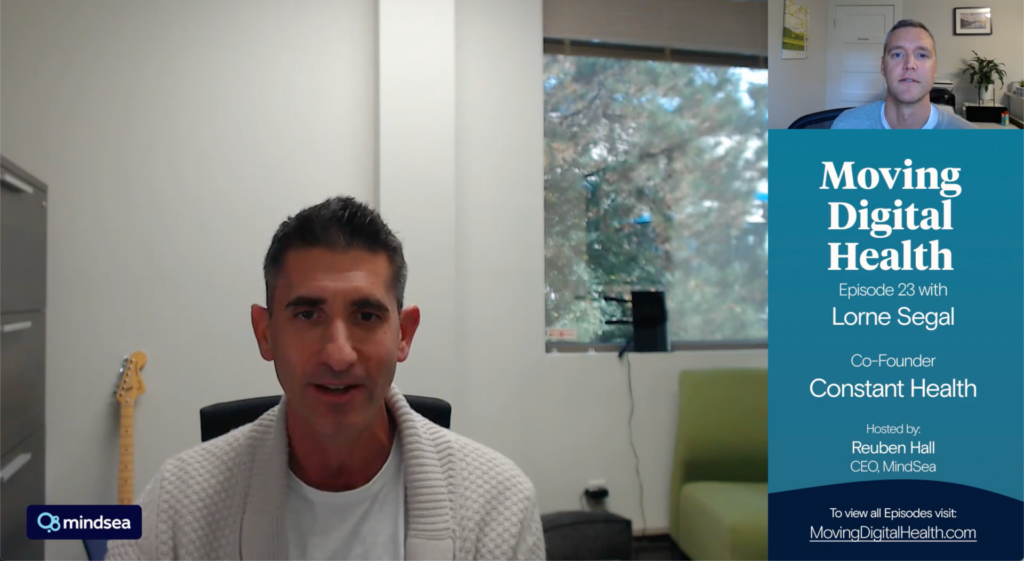Innovation in digital technology is transforming our lives in many ways. Beyond virtual work and school, this innovation is also improving various industries like gaming, manufacturing, retail, finance, and healthcare.
Businesses in these industries that adopt a digital model are seeing benefits across the board like improvement in operational efficiency by 40%, increased time to market speed by 36%, and improvement in meeting customer expectations by 35%.

The healthcare industry is unique from the rest of the industries listed, however. This is because there are a variety of issues impacting society-at-large that require solutions–and quick.
Healthcare apps and integrated cross-platform solutions have the opportunity to solve these issues and positively affect the way doctors and healthcare providers deliver care. That’s great news since patients can experience improvements almost immediately.
Thanks to advancements in digital healthcare technology and the companies behind them, support is being provided so that patients around the world can receive the care they need.
Let’s take a look at some of these current issues and the companies providing solutions.
Healthcare Staffing Shortages
The Problem
Due to reasons like changing demographics and turnover rates, there are concerns around shortages of nurses in the United States.
Healthcare staffing shortages have been a worry for some time now because of the nation’s increasingly aging population, but COVID-19 has only added to the concern. The pandemic has caused about 3 in 10 healthcare workers to consider leaving their profession.

Prior to the pandemic, studies predicted physician staffing shortages by upwards of 140,000 by 2030, as well as shortages of in-home health aides, nursing assistants, nurse practitioners, and medical lab technicians by 2025.
If the pandemic has taught us anything, it’s how important healthcare practitioners are. Without them, we wouldn’t be able to live a free and healthy life.
The Solution
BookJane’s all-in-one software is here to help.
Their J360 platform seamlessly connects care facilities, agencies, and care worker team members to effectively facilitate filling shifts while leveraging each business’s unique strengths and requirements.
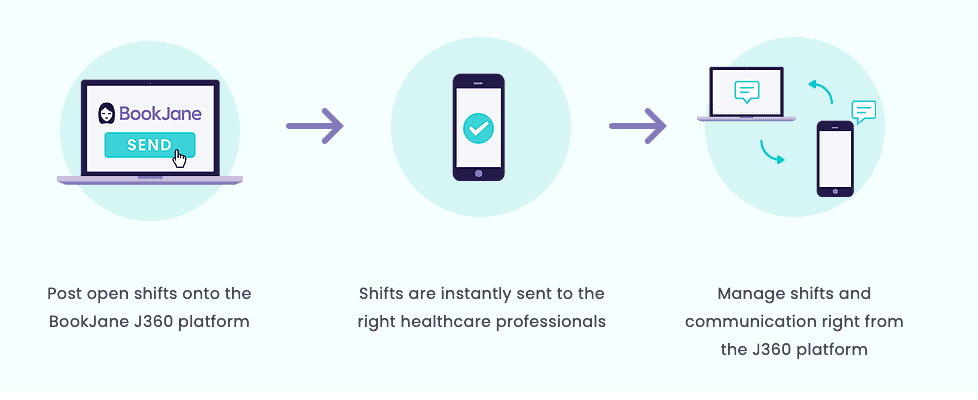
This cloud-based system fills the gaps in staff shortages by empowering healthcare workers and finding qualified professionals, ultimately assisting healthcare facilities to deal with staffing challenges.
Changing Consumer Behaviors
The Problem
Since the landscape is improving and patients are now actively engaged in their healthcare, there are increasingly greater expectations for high-quality service from providers.
Patients demand a streamlined experience that allows them to quickly resolve any issues or concerns like booking appointments, paying bills, or checking account/insurance statuses whenever, wherever, and however is most convenient for them.
If the experience does not address their unique pain points, patients will question whether the services from healthcare providers are worth their hard-earned money.
The Solution
Medici exists to improve the doctor-patient relationship through new methods of communication and care delivery.
Their telemedicine solution includes a mobile app and cross-platform system that creates a better patient experience by allowing patients to interact with their healthcare providers whenever, wherever, and however they want.
Medici is helping to not only empower patients with convenience and accessibility but is also helping providers deliver the highest quality care.
Heightened Need For Cybersecurity
The Problem
Connected medical devices and a greater need to keep the records of patient information secure attract the attention of hackers. As more connected medical devices arise, so too will cyber attacks.
There are several reasons for this. The biggest is that cybercriminals can use specific medical details found in patient records to steal money and other valuable data.
More security measures are needed to protect medical devices and reduce the exposure of protected health information so that it’s not compromised.
The Solution
MedCrypt allows for the easy addition of proactive security measures to all medical devices.
Its cybersecurity provides continued vulnerability monitoring long after it has been released, highlighting any potential weaknesses in a device.
This also means its system is proactive–rather than reactive–in defending against security breaches.

Since 2016, MedCrypt has worked to ensure that all medical devices are as safe and secure as technologically possible so that no patients have to worry about their data being hacked.
Accessibility For All
The Problem
Approximately 15% of patients in the U.S. live in rural areas and are disproportionately more likely to struggle to access healthcare services than patients living in urban/suburban areas.
This barrier to access due to geographic distance, extreme weather conditions, environmental and climatic barriers, lack of public transportation, and poor infrastructure increases the risk of medical emergencies like death for these people living in rural communities.
It also increases patients’ physical and emotional stress, reducing the likelihood of seeking follow-up care and limiting family support because of proximity issues.
The Solution
Practo connects patients with healthcare providers to consult on health-related issues so they can determine what steps to take without having to travel long distances to healthcare facilities.
Their healthcare app allows patients to do things like book appointments, order medicine, consult doctors and set medicine reminders with a few swipes of their fingertips.
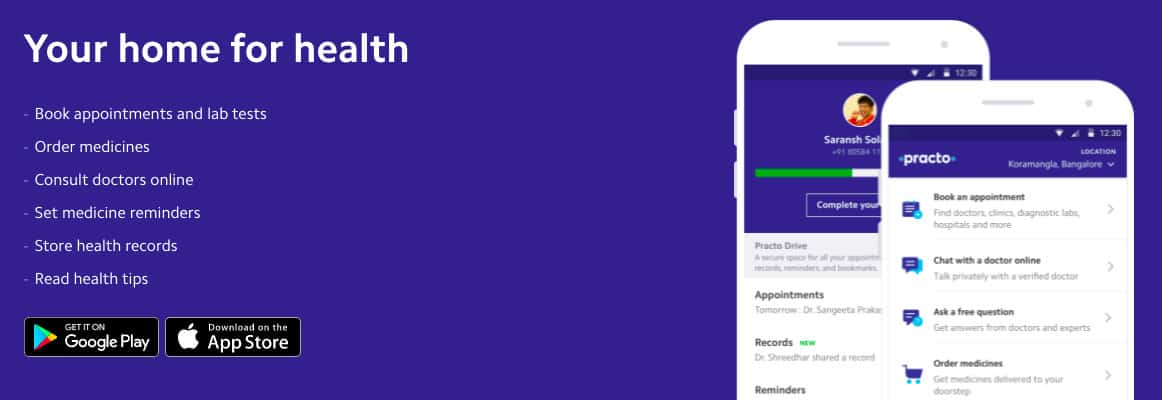
This type of technology gives isolated patients access to a healthcare provider from anywhere in the world at any time.
Interoperability And Integration
The Problem
Achieving interoperability between healthcare providers and systems is not easy. This creates problems throughout healthcare and presents barriers to delivering great patient experiences and outcomes.
Some of the most common challenges with interoperability are:
- Lack of consistency when identifying patients
- Lack of standards for managing info between health systems
- Difficulty with measurement and improvement between systems
- Information blocking by vendors
Digital healthcare systems that lack interoperability and integration render themselves invaluable and inefficient.
The Solution
AirStrip’s digital healthcare platform, Tricefy, is making improvements in healthcare delivery by creating innovative technology for caregivers to collaborate and care for their patients.
With Tricefy, healthcare providers access patient data and waveforms in one centralized location, which improves care and decision-making within healthcare facilities.
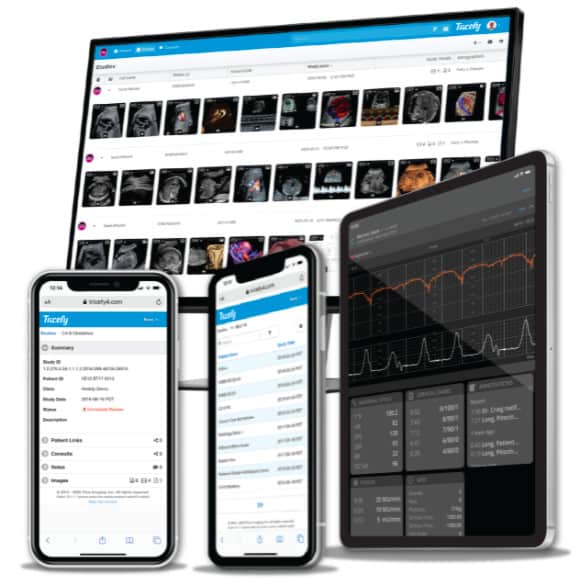
Using these cutting-edge tools allows healthcare providers to adapt quickly to changing environments and to use healthcare systems effectively and efficiently.
Growing Number Of Seniors
The Problem
Seniors (65+) currently make up about 17% of the population in the U.S. Due largely to the baby boomer generation, this percentage continues to grow, with a projected 22% of the U.S. population becoming seniors by 2050.
With this growth comes a heightened need for greater attention to matters important to this age group–like healthcare.
The physical and emotional burden of providing care to aging patients is a complex and expensive feat if not dealt with appropriately.
The Solution
CarePredict’s Tempo Series 3 is a smart wearable technology for seniors that uses artificial intelligence to learn and follow daily routines so caregivers can rest assured that loved ones are safe, wherever they are and whatever they’re doing.
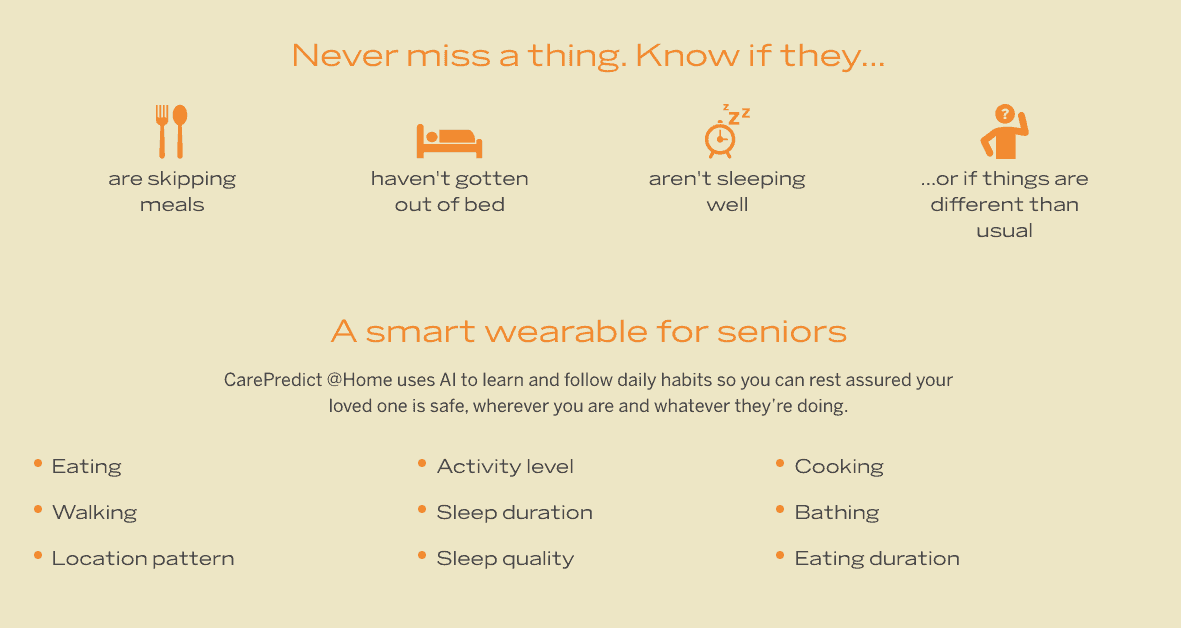
This technology is essentially an all-in-one caregiver equivalent that seniors can use at all times. It mitigates risk, allows for life autonomy, and keeps healthcare costs low.
Medication Nonadherence
The Problem
Medical nonadherence is defined by the AMA as “when patients don’t take their medications as prescribed.” Unfortunately, they state that it is “fairly common, especially among patients with chronic disease.”
There are several reasons for medical nonadherence, including:
- Fear and worry;
- Cost;
- Misunderstanding;
- Complex medication schedules;
- Lack of symptoms;
- Mental health issues.
While these reasons are understandable, without medical adherence, patients increase the likelihood of harm to themselves.
The Solution
Blue Charm provides patients with interactive mobile platforms that assist in managing their healthcare and medications.
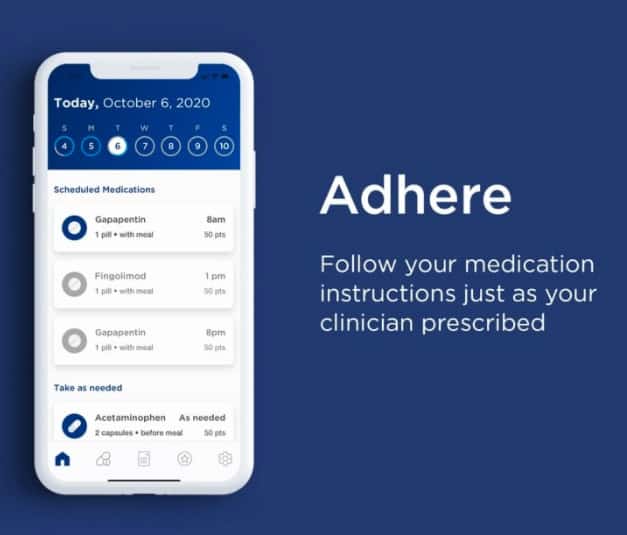
Their mission is to solve the complex problems associated with medication nonadherence and educate patients about medicine so that they can feel more confident about taking what’s prescribed to them.
MindSea is a technology partner for Blue Charm and is currently helping them build their mobile app solution so that it will provide patients with an interactive platform to assist in managing their health.
Rising Healthcare Costs
The Problem
Last, but certainly not least, rising healthcare costs are adding a ton of pressure to the industry.
Reports show that healthcare spending in the U.S. during 2019 was nearly $3.8 trillion, or $11,582 per person. By 2028, these costs are expected to climb to $6.2 trillion—roughly $18,000 per person.

The primary reasons for this escalation are the aging population and the increasing cost of healthcare services.
With these rising healthcare costs, there is increased pressure on governments, manufacturers, and consumers to determine ways to mitigate the growing expenditures.
The Solution
The truth is, every digital health app and cross-platform system aims to help with rising healthcare costs.
They achieve this by doing things like improving efficiency through automating administrative tasks, lowering overhead and staffing costs, optimizing the supply chain, and decreasing readmission rates.
MindSea is one of the many companies that is focusing efforts on improving the healthcare industry and lowering costs through digital solutions.
Constant Health and PsychScope are two digital health apps that we helped create to improve the lives and healthcare management of users.

Constant Health helps users achieve their best weight and lead a better lifestyle overall, whereas PsychScope helps youth dealing with depression better manage their mental illness.
Wrapping Up
There is no doubt that digital technologies are changing the way we live–and now they’re helping to improve patients’ health by empowering them to access safe and affordable healthcare. Additionally, advancements are helping the healthcare industry and providers to deliver better care to all.
As the world continues to innovate and launch new healthcare solutions, we will see improved costs (for both patient and provider), shorter wait times, better patient engagement, and increased access to care.
MindSea loves building secure and intuitive healthcare apps that improve lives. From design to development, we take pride in partnering with health companies to bring their mobile solutions to life.
If you are looking to build a digital health solution, schedule a discovery call, and let’s build something amazing together.



